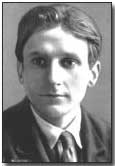Prose & Poetry - Edmund Blunden
 Edmund Blunden (1896-1974) was born on
1 November 1896 in London, raised in Kent and educated first at Christ's Hospital, where he discovered a talent for calligraphy, and then at The Queen's College.
Edmund Blunden (1896-1974) was born on
1 November 1896 in London, raised in Kent and educated first at Christ's Hospital, where he discovered a talent for calligraphy, and then at The Queen's College.
By the time war was declared Blunden had already published some of his verse (Georgian Poetry, 1914).
He served with the Royal Sussex Regiment from 1915-19, fought at both the Somme and at Ypres, and was awarded the Military Cross during the Somme battle.
Blunden's war memoir, Undertones of War (1928), is one of the great accounts of the war, and yet at the same time manages to be highly evocative of the home life of the English countryside.
Throughout the duration of the war Blunden also wrote and published volumes of poetry included within which was the celebrated Third Ypres (written in November 1917).
Shortly before the great German Spring push of March 1918, Blunden was sent home on rest leave for six months. This effectively brought Blunden's war to a close.
Following the war Blunden held academic posts in the Far East, in Tokyo and Hong Kong (where he spent ten years at the latter), including Professor of English at Tokyo University. He was a Fellow of Merton College, Oxford, from 1931-44, and was elected Oxford Professor of Poetry in 1966, succeeding Robert Graves who had served from 1961-66. Ill-health obliged him to give up this post in 1968.
Described by Paul Fussell as "poet, scholar, editor and man of letters" Blunden published studies of Lamb, Hunt, Shelley and Hardy, and edited editions of Owen and Gurney's work. He also published on wider subjects such as the English countryside (English Villages) and cricket (Cricket Country).
Retired to Hall Mill in Suffolk for the last ten years of his life, Edmund Blunden died on 20 January 1974, having married three times. In his lifetime he had published over 1,000 poems and 3,000 articles and reviews. His gravestone bears the inscription, "I live still to love still things quiet and unconcerned".
Preparations For Victory (1918)
My soul, dread not the pestilence that hags
The valley; flinch not you, my body young.
At these great shouting smokes and snarling jags
Of fiery iron; as yet may not be flung
The dice that claims you. Manly move among
These ruins, and what you must do, do well;
Look, here are gardens, there mossed boughs are hung
With apples who bright cheeks none might excel,
And there's a house as yet unshattered by a shell.
"I'll do my best," the soul makes sad reply,
"And I will mark the yet unmurdered tree,
The tokens of dear homes that court the eye,
And yet I see them not as I would see.
Hovering between, a ghostly enemy.
Sickens the light, and poisoned, withered, wan,
The least defiled turns desperate to me."
The body, poor unpitied Caliban,
Parches and sweats and grunts to win the name of Man.
Days or eternities like swelling waves
Surge on, and still we drudge in this dark maze;
The bombs and coils and cans by strings of slaves
Are borne to serve the coming day of days;
Pale sleep in slimy cellars scarce allays
With its brief blank the burden. Look, we lose;
The sky is gone, the lightless, drenching haze
Of rainstorms chills the bone; earth, air are foes,
The black fiend leaps brick-red as life's last picture goes.
In slang a "beetle" was a landing craft for 200 men.
- Did you know?
